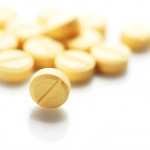
Depression is a common condition, affecting hundreds of millions of people around the world and has become the leading cause of disability in Europe. Although incredibly prevalent, treatment for depression is not always effective, with only one third of patients achieving remission with antidepressants.
Folate may have a role in treating depression. Lower levels of folate have been found in individuals with depression and lower folate levels have been associated with poorer responses to antidepressants. Given that folate is essential for the production of serotonin and noradrenaline in the human brain, and antidepressants act to increase the amount of these neurotransmitters, folate may be beneficial in increasing the effectiveness of antidepressants.
Previous studies on supplementing with folic acid during treatment for antidepressants have produced contradictory results as to its effectiveness, but have also been poorly powered. The overall objective of the FolATED (Folate Augmentation of Treatment – Evaluation for Depression) study was to assess the clinical effectiveness and cost effectiveness of supplementing with folic acid during treatment with antidepressants for moderate to severe depression. FolATED also looked into whether baseline folate levels predicted response to antidepressant medication.

The FolATED randomised trial and economic evaluation set out to estimate the clinical effectiveness and cost-effectiveness of folic acid as adjunct to antidepressant medication.
Participants
- Recruited from 3 centres across Wales between 2007 and 2010.
- Referred patients were screened for eligibility – the researchers were looking for people with moderate to severe depression, meaning a score of at least 19 on the Beck Depression Inventory (BDI-II) at screening, and at least 17 when commencing the study. Potential participants also had to be treated with, or about to start, antidepressant medication. People were excluded from participating on various grounds, such as being deficient in folate or B12, having taken folic acid supplements in last 2 months or having other conditions, from psychosis to terminal illness.
- 440 participants completed the study. Of these, only 343 participants had complete data, as missing data was imputed where feasible.
Methods
- Screening for participation took part 2 weeks before commencing the study, with time to commence antidepressant medication if needed. Another assessment took part at 1 week pre-study to check on progress of medication.
- Participants were randomly assigned to folate supplementation (with 5mg of folic acid) or control group by algorithm to ensure characteristics, such as gender, type of antidepressant medication or participant’s research centre were roughly equally represented in the two samples.
- Double blind design.
Outcomes
Assessed at baseline (week 0), and 4, 12 and 25 weeks thereafter:
Mental health
- BDI-II (primary outcome)
- Clinical Global Impression (CGI)
- Montgomery–Åsberg Depression Rating Scale (MADRS)
- UKU side effects scale
- Mini International Neuropsychiatric Interview (MINI) suicidality subscale.
No significant differences between the folate and placebo groups were found using the above measures.
General health
- UK 12-item Short Form Health Survey (SF-12; both mental and physical components)
- European Quality of life scale – 5 Dimensions (EQ-5D).
The only significant result was found on the mental health section of the SF-12 (on which higher scores show better health) where the placebo group had a higher mean score of 34.09, compared with the folate group’s score of 31.99.
Compliance
- Morisky Questionnaire
No differences were found in compliance between the two experimental groups.

Trial participants were randomised to 5 mg of folic acid or placebo every day for 12 weeks.
Results
Cost effectiveness
No significant differences were found in resource use and costs between the folic acid and placebo groups – treatment taken by the folic acid group was just £48 cheaper on average, when costs were adjusted for group differences at baseline. Similarly, there were no significant differences between the folic acid and placebo groups in gain of quality-adjusted life years (QALYs).
Biochemistry (undertaken through blood tests at 0, 12 and 25 weeks)
- Serum and red cell folate
- Homocysteine (elevated levels indicate folate deficiency)
- Vitamin B12 (important to consider, as people low in vitamin B12 can be adversely affected by high folate levels)
Supplementing with folic acid was found to be effective at increasing folate levels and decreasing homocysteine levels, compared with placebo.
Overall, participants’ biochemistry had little relationship with the other measures. Only on the CGI Improvement scale did baseline biochemistry predict outcome, though only for red cell folate and homocysteine. In this case, homocysteine produced a strong effect, with a single unit of baseline homocysteine increasing CGI improvement by 0.05 (95% CI from 0.03 to 0.08; p < 0.001).
Participants deficient in red cell folate showed significant differences between folic acid and placebo on the mental component score from the SF-12 and CGI Severity (with several other measures being marginally significant). However, only 9 participants fell into this subset.

These results undermine guidance that advocates folic acid for treating depression.
Conclusion
The authors concluded that:
The FolATED trial generated no evidence that folic acid was clinically effective or cost-effective in augmenting antidepressant medication.
Given the large sample size and stringent blinding procedures used in the FolATED study, the conclusions drawn are likely to be valid.
The authors suggest that their negative results may have arisen due to the use of the biologically inactive folic acid to supplement folate, rather than the biologically active methylfolate. This folic acid may have competed against methylfolate for folate receptors for transport across the blood-brain barrier, and so have effectively increased folate deficiency in the brain, leading to the negative results. From this, the authors suggest that it would be beneficial for future research to investigate whether methylfolate, rather than folic acid, is an effective adjunct for antidepressants.


RT @Mental_Elf: Folic acid for depression: FolATED finds methylfolate is a better candidate for augmenting antidepressants http://t.co/xSjZ…
Folic acid for depression: FolATED finds methylfolate is a better candidate for augmenting antidepressants: Su… http://t.co/YvvhSeLZmI
Rosie Valdez liked this on Facebook.
The Mental Elf liked this on Facebook.
.@Mental_Elf @cialdella01 er, what? It concludes that the trial shows no efficacy of folic acid……. #WTF
Today Susie Johnson reports on the FolATED RCT and economic evaluation of folic acid for depression http://t.co/tom4P0Ut7E
Guidance that advocates folic acid for treating depression is undermined by the FolATED RCT http://t.co/tom4P0Ut7E
Christina Armstrong-Graham liked this on Facebook.
Mental Elf: Folic acid for depression: FolATED finds methylfolate is a better candidate for augmenting… http://t.co/c4TgIYUUyt
June Dunnett liked this on Facebook.
Andy Conway liked this on Facebook.